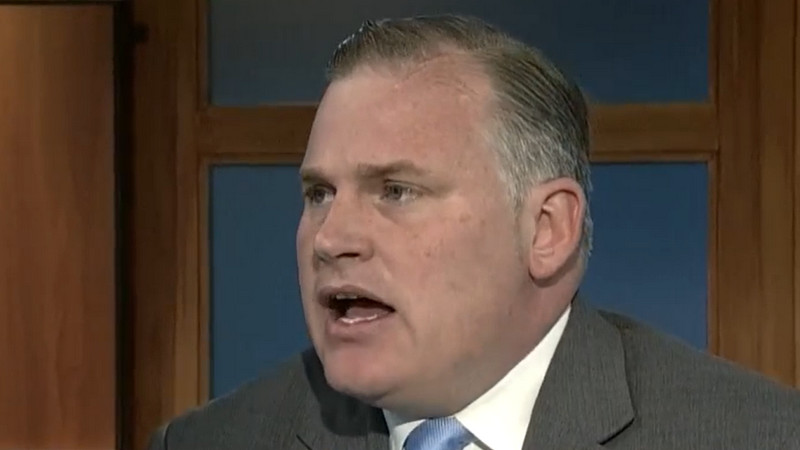Opinion
As a gay man who is happily married to the love of my life, it may seem strange that I welcomed a recent statement from hard-right Supreme Court justices Clarence Thomas and Samuel Alito calling for the court’s 2015 marriage equality decision to be reversed.
I don’t agree with their position, of course, but I’m glad they made it clear. It will help Americans understand just how eager anti-equality forces are to reverse our progress—and how desperately they want to get Amy Coney Barrett on the Supreme Court to make it happen, demolish the Affordable Care Act, overturn Roe v. Wade, and criminalize abortion.
Let’s start by recognizing that a supermajority of Americans supports marriage equality for same-sex couples and legal protections for LGBTQ Americans from discrimination. Anti-equality activists are demanding, and now eagerly anticipating, that a Supreme Court dominated by right-wing ideologues will undermine the fundamental and popularly supported principle of equality under law when it comes to LGBTQ people.
It doesn’t take a lot of tea-leaf reading to understand that marriage equality is vulnerable. Barrett sided with the right-wing justices who dissented angrily from the court’s 2015 marriage equality ruling, suggesting the issue should have been left to the states. She has also suggested that laws against sex discrimination don’t protect people from discrimination on the basis of sexual orientation or gender identity.
At the now infamous White House event announcing her nomination, Barrett called the late anti-gay Justice Antonin Scalia her mentor, and said, “His judicial philosophy is mine, too.”
Scalia was a notorious opponent of the idea that LGBTQ people are protected under the Constitution and federal civil rights laws, so that statement is alarming by itself. The threat is even clearer when you look at what equality opponents are saying.
Jenna Ellis, a Trump campaign attorney and a fellow at Liberty University’s Falkirk Center, was thrilled with the Thomas-Alito slam on Obergefell , tweeting, “First day of Supreme Court term and Justice Thomas is lit.” Ellis is an enthusiastic booster of Barrett’s confirmation.
Brian Brown, president of the anti-equality National Organization for Marriage, greeted Barrett’s nomination with excitement, calling her a “perfect pick” and telling his supporters, “We’ve never had a bigger opportunity to advance our cause.”
Brown’s colleague Frank Schubert, a political operative behind an ugly string of campaigns that portrayed marriage equality as a threat to children, used similar rhetoric after the death of Justice Ruth Bader Ginsburg, saying in an email that another Trump justice would “pave the way for the restoration of marriage to our laws and scrapping the illegitimate, anti-constitutional imposition of same-sex ‘marriage’ on the nation.”
If you’re not someone who spends a lot of time reading anti-LGBTQ publications or attending religious-right events, you might be surprised to find out that five years after the Obergefell ruling, many anti-gay activists don’t consider marriage equality to be settled law. They have never accepted the ruling as legitimate, and they are aggressively seeking to undermine and overturn it, the way they have battled for decades to undermine and overturn Roe v. Wade.
One of the right-wing groups Trump has relied on to vet potential judicial nominees is the Heritage Foundation, whose senior research fellow Ryan Anderson is one of the most vocal opponents of legal equality and legal protections for LGBTQ people and their families.
Anderson has urged social conservatives to treat the Obergefell decision as fundamentally illegitimate and published a road map for overturning it. His mentor, Princeton University professor Robert George said at the time, “We must reject and resist an egregious act of judicial usurpation.”
The continuing resistance to LGBTQ progress does not end with marriage equality. Anderson opposes virtually any compromise with the LGBTQ equality movement, rejecting nondiscrimination laws even if they include broad religious exemptions.
But even that is not as far as Anderson goes. He is impatient with fellow anti-equality activists who have strategically reframed legal arguments about equality as questions of “religious liberty” but don’t want to engage directly on the substantive issues, writing, “They prefer the safer, more respectable, less icky ground of religious liberty.” Conservative legal victories won via that strategy are good, he argues, but they’re not nearly enough. Anderson wants people with traditional views on sexuality and gender to wage a campaign to “evangelize” people with “the truth about the human person and human sexuality.”
To paraphrase Anderson, in the long run, if you want law to protect your right to act on the belief that same-sex relations are unnatural and unworthy of recognition or respect—and that it’s wrong to accept transgender people’s gender identity—than you have to make that case in public and not just fall back on religious liberty arguments.
You can hear a similar desire for a return to a time when gay people were disfavored in law and demonized in popular culture from Trump’s religious-right backers, like those who gathered on the National Mall recently for “The Return.” They say Americans’ embrace of marriage equality is a sin requiring national repentance. They blame it on Hollywood promoting tolerance of “perversion” and on preachers who they say haven’t been aggressive enough in preaching that acceptance of homosexuality is evil and invites God’s wrath on the nation.
Of course, this hostility pre-dates the marriage equality movement. Religious conservatives have opposed every advance in cultural acceptance and legal recognition of the rights and dignity of LGBTQ people, including efforts to protect us in laws targeting violent hate crimes, allow us to teach or work for the federal government and serve openly in the military, and prevent us from being discriminated against in the workplace. Religious-right groups even fought to uphold state laws that made gay people de facto criminals, laws that were used to take people’s jobs and even children away from them.
Less than 20 years ago, Anderson’s mentor Robert George, an intellectual godfather to the anti-equality movement, wrote the legal brief filed by Focus on the Family and the anti-LGBTQ hate group Family Research Council in the Lawrence v. Texas case urging the Supreme Court to uphold state laws criminalizing consensual homosexual conduct. Its argument that such laws were about protecting marriage uniquely defined as a relationship between one man and one woman are echoed in Anderson’s writings today.
Scalia, whose judicial philosophy Barret says is her own, dissented from the court’s rejection of sodomy laws, comparing them to laws against bestiality and accusing the majority of having embraced “the so-called homosexual agenda.”
After the Supreme Court recognized the right of same-sex couples to marry, Anderson and other right-wing activists pledged that they would wage a generation-long battle to reverse it if necessary, the way that they have fought for decades to undermine and reverse Roe v. Wade. But with Trump and Senate Majority Leader Mitch McConnell filling the federal courts with narrow-minded judges—and attempting to force Amy Coney Barrett onto the bench through a rushed and illegitimate political power play—they are hoping they won’t have to wait very long to celebrate same-sex couples and their families being stripped of legal recognition and protections.








